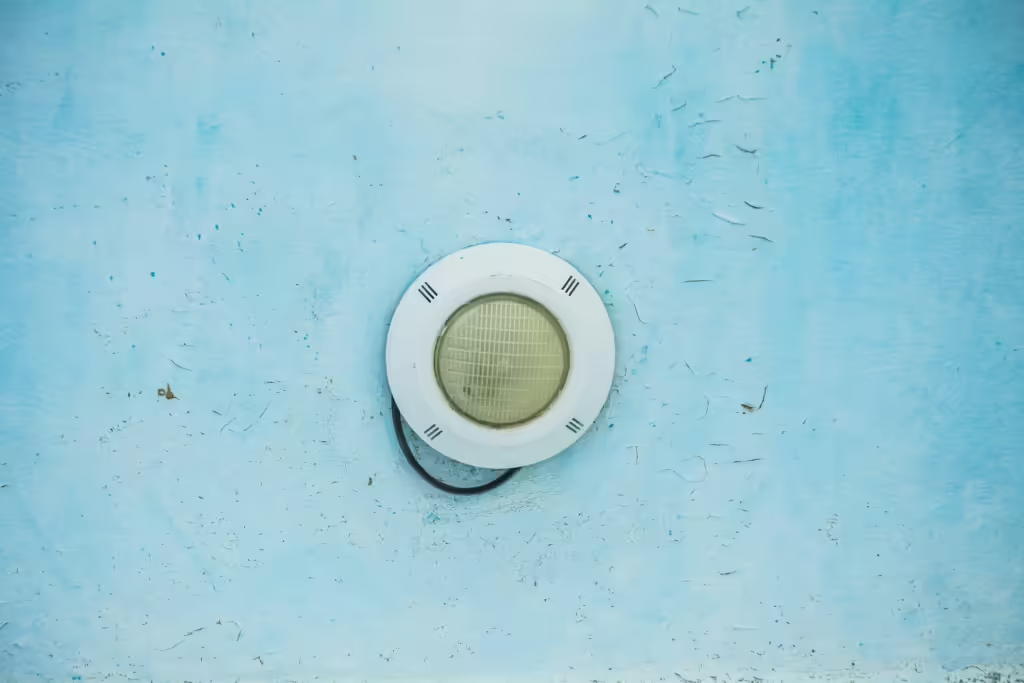Pool lights may experience problems such as flickering or dimming caused by loose wiring, failing bulbs, or low voltage from the transformer. Lights that don’t turn on could result from tripped breakers, burned-out bulbs, or malfunctioning transformers. Water leaks around the fixture often stem from damaged gaskets, leading to corrosion or electrical issues. Discoloration or fading lights are usually due to worn lenses or low-quality LEDs.
To address these issues, check the power supply, inspect and replace bulbs or LEDs, secure or replace waterproof seals, and test the transformer’s voltage output. For complex electrical problems or fixture replacements, it’s best to call a professional for safe and effective repairs.
Pool lights are more than just decorative—they enhance the safety of nighttime swims and extend your pool’s usability into the evening. However, like any pool component, they can develop problems over time. Addressing these issues promptly ensures your pool remains safe, functional, and inviting.
If your pool lights are flickering, dimming, or not turning on, this guide will help you troubleshoot common issues and know when it’s time to call in the professionals.
How Do Pool Lights Work?
Understanding how pool lights function can make it easier to identify and address potential issues.
Halogen vs. LED Pool Lights
- Halogen Lights:
- Bright and durable, but consume more energy and generate significant heat.
- Require more frequent replacement compared to LEDs.
- LED Lights:
- Energy-efficient, long-lasting (up to 50,000 hours), and available in customizable colors.
- Produce minimal heat, making them safer and more durable.
Due to their energy efficiency and versatility, LED lights are now the preferred choice for most pool owners.
Waterproof Housing and Wiring
- Waterproof Niches: Lights are housed in sealed, waterproof niches within the pool wall. Damaged seals can allow water leaks, risking electrical damage.
- Voltage Regulation: A transformer reduces standard voltage to a safer level (typically 12 volts) for underwater lighting. Faulty wiring or transformers can lead to flickering or outages.
- Heat Dissipation: Proper installation ensures heat is dissipated underwater, especially for halogen lights.
Common Pool Light Issues
1. Flickering or Dim Lights
- Causes: Loose wiring, failing bulbs, or insufficient voltage from the transformer.
2. Lights Not Turning On
- Causes:
- Tripped breakers or faulty GFCI outlets.
- Burned-out bulbs or malfunctioning transformers.
3. Water Leaks Around the Fixture
- Causes: Damaged gaskets or seals, leading to corrosion or short circuits.
4. Discoloration or Fading
- Causes: Worn lenses or low-quality LEDs losing brightness or color-changing abilities over time.
Troubleshooting Pool Light Problems
While some issues require professional help, you can address others with these steps:
1. Check Power Supply
- Inspect breakers and GFCI outlets to ensure they haven’t tripped. Reset if needed.
2. Replace Bulbs or LEDs
- Halogen Bulbs: Remove the fixture, check the bulb, and replace if burned out.
- LED Lights: Verify compatibility with your transformer before replacement.
3. Inspect Seals
- Check gaskets for cracks or wear. Replace damaged seals and tighten screws to restore the waterproof barrier.
4. Test Transformer Output
- Use a multimeter to confirm voltage output. If it’s below the required level, the transformer may need repair or replacement.
When to Call a Professional
Certain situations require expert intervention:
- Electrical Repairs: Pool lighting involves electricity near water, making it inherently risky for DIY fixes. Professionals ensure safety and compliance with local codes.
- Complex Diagnoses: Persistent flickering, recurring leaks, or transformer failures may involve multiple components requiring professional diagnosis.
- Fixture Replacement: Replacing corroded or damaged underwater lights often involves specialized tools and techniques.
Preventive Maintenance Tips
Regular maintenance can extend the lifespan of your pool lights and reduce the likelihood of issues:
1. Inspect Seals Regularly
- Check gaskets and housings for wear or damage. Clean debris from around the light niches.
2. Upgrade to LED Lights
- Switch from halogen to LEDs for longer lifespan, energy efficiency, and reduced heat output.
3. Schedule Annual Inspections
- Have a professional inspect wiring, transformers, and seals annually to catch potential problems early.
Final Thoughts
Functional pool lights are essential for safety, ambiance, and nighttime enjoyment. Whether you’re dealing with flickering lights, leaks, or power issues, addressing these problems early can prevent costly repairs and maintain your pool’s usability.
If troubleshooting doesn’t solve your issue, search for “pool light repair near me” and trust Cabana Pools. Our experienced technicians specialize in diagnosing and fixing pool lighting problems, ensuring your pool stays bright, safe, and inviting year-round. Call us today to schedule your repair or maintenance service!
FAQs About Pool Light Issues and Repairs
1. Why is my pool light flickering or dim?
Flickering or dim lights are often caused by loose wiring, a failing bulb, or insufficient voltage from the transformer. Checking the connections and replacing worn components usually resolves the issue.
2. What should I do if my pool light won’t turn on?
First, check the power supply by inspecting breakers and GFCI outlets. If the light still won’t turn on, the issue could be a burned-out bulb or a malfunctioning transformer, which may require repair or replacement.
3. How do I prevent water leaks around my pool light fixture?
Regularly inspect the gasket around the light housing for cracks or wear. Replace damaged gaskets and tighten fittings to maintain a waterproof seal and prevent leaks.
4. Should I upgrade from halogen to LED pool lights?
Yes, upgrading to LEDs is a great choice for improved energy efficiency, longer lifespan, customizable color options, and reduced heat output compared to halogen lights.
5. When should I call a professional for pool light repairs?
You should call a professional if you encounter electrical issues, recurring leaks, or need to replace a corroded fixture. Electrical repairs near water can be risky, so it’s best to trust an expert for safe and effective solutions.



